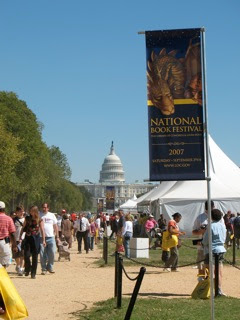M.T. Anderson Speaks! (Part I)
Oct 10
2007
 Behold again: here's the first part of my interview with the fantastically awesome M.T. Anderson! The second part will be posted soon. Please note that this interview includes questions from a student from George Mason University (known here as GMU) and a high school television reporter (known here as HSR):
Behold again: here's the first part of my interview with the fantastically awesome M.T. Anderson! The second part will be posted soon. Please note that this interview includes questions from a student from George Mason University (known here as GMU) and a high school television reporter (known here as HSR):HSR: Why are you here at the National Book Festival?
MTA: Because I was invited and there was free food.
GMU: We were just talking about how many different books you had written. The collection of books is so diverse—how do you decide your subject matter? You clearly jump from subject to subject, and you don’t seem to be limited by age group or anything.
MTA: Well, I wrote about whatever caught my interest. For example, I wrote Feed, which allowed me to make up absolutely anything I wanted to, stick it on the page, and call it reality. But then I had always really liked 18th century music, so I thought: heck, I’ll do some research on that. The cool thing about having a varied approach to these books was that one allowed me to say anything I wanted to, while another presented me with all of these very complicated things to look into and research. Which was actually tremendously fun—but I couldn’t even mention an article of clothing without making sure that it still existed, or existed in the same form. But in the middle of doing that work I was like, “Oh, I can’t stand this anymore, I just want to say they ate a burger! I don’t want to have to go look up what they would have eaten!” At that point it was a relief to turn to, say, some of the middle-grade comic fantasy novels I’ve written, like Whales on Stilts, and just put anything I wanted to on the page and be funny. Each approach is kind of an antidote to the previous one, and helped me refocus. If I worked in the same vein for each book, I think I’d be very tired.
Wordcandy: You’ve written a few very funny, surreal children’s books, while your stories for older readers are much darker. Are we going to see more of a crossover between your two styles?
MTA: Feed was kind of like that—it was both comic and satirical. There are some funny parts in the sequel to Octavian Nothing, but it’s not exactly a ripsnorter; it’s about incredible human cruelty and oppression. I think I naturally see comic elements as having the ability to embody the kind of grotesqueness that’s part of human nature.
GMU: Your books seem to market to children and young adults, yet they appeal to a larger adult audience. Do you tend to write with a specific audience in mind?
MTA: Some of them I wrote with a specific audience in mind, like Whales on Stilts and The Clue of the Linoleum Lederhosen. I wrote those thinking of 10-year-olds. However, Octavian Nothing is a historical novel—that was a case where I had to force myself to not think of an audience. I wanted to imagine how the character would really speak, regardless of the readership. I tried to blank out the idea of a specific audience, because if I started worrying about “Will people understand this?” or whatever, then I was going to end up stunting him as a character. So, in order to make him fully bloom, I blocked out the idea of an audience and wrote what I honestly believed he’d write and say.
Wordcandy: When you get to a point when you're really low on inspiration and the muses have run away, what do you do? Is there a particular piece of music or a book that you turn to that relaxes you enough to find that inspiration?
MTA: That’s a great question and the answer is yes, for both of those. For each project, I tend to have pieces of music that embody the texture of the writing that I want in that project. Sometimes they’re a piece of music from the period of time featured in the book’s setting, and sometimes there’s just something about them that makes it feel like the kind of prose I want for a particular project. I also read authors who, one way or another, shove me in the right direction. For example, for the 18th century book I continually read 18th century novels, so my natural voice began to write in stilted, 18th century-style prose. But sometimes I would read something modern that gave me a little side wind….
I’m very careful about what I read when I’m writing, because you tend to take on a tinge of whatever it is you’re reading when you write. I don’t know if you've ever noticed when you're writing book reviews, but sometimes you write the review and realize that you’ve written it in the style of the book you’re reviewing. It’s very hard to separate yourself from what you read, which is why it is important to judge what you read carefully.
Posted by: Julianka
No new comments are allowed on this post.
Comments
No comments yet. Be the first!